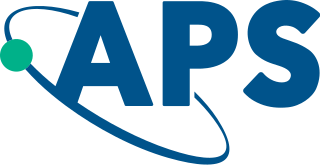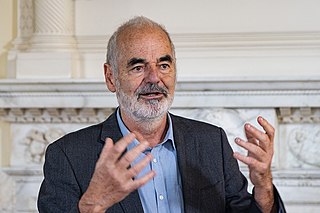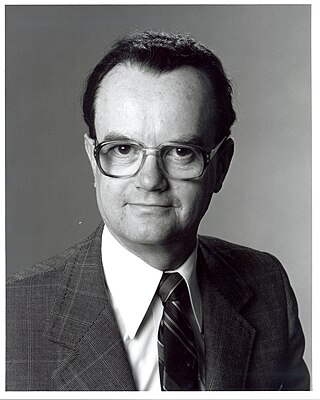Related Research Articles

The International Astronomical Union is a non-governmental organisation with the objective of advancing astronomy in all aspects, including promoting astronomical research, outreach, education, and development through global cooperation. It was founded in 1919 and is based in Paris, France.

The American Physical Society (APS) is a not-for-profit membership organization of professionals in physics and related disciplines, comprising nearly fifty divisions, sections, and other units. Its mission is the advancement and diffusion of knowledge of physics. The society publishes more than a dozen scientific journals, including the prestigious Physical Review and Physical Review Letters, and organizes more than twenty science meetings each year. APS is a member society of the American Institute of Physics. Since January 2021 the organization has been led by chief executive officer Jonathan Bagger.
The Office for National Statistics is the executive office of the UK Statistics Authority, a non-ministerial department which reports directly to the UK Parliament.
The American Statistical Association (ASA) is the main professional organization for statisticians and related professionals in the United States. It was founded in Boston, Massachusetts on November 27, 1839, and is the second oldest continuously operating professional society in the US. The ASA services statisticians, quantitative scientists, and users of statistics across many academic areas and applications. The association publishes a variety of journals and sponsors several international conferences every year.
The International Epidemiological Association (IEA) is a worldwide association with more than 2000 members in over 100 different countries, who follow the aims of the association to facilitate communication amongst those engaged in research and teaching of epidemiology throughout the world, and to encourage its use in all fields of health including social, community and preventative medicine. These aims are achieved by holding scientific meetings and seminars, by publication of journals, reports, translations of books, by contact amongst members and by other activities consistent with these aims. Members are accepted without regard to race, religion, sex, political affiliation or country of origin.

Calyampudi Radhakrishna Rao was an Indian-American mathematician and statistician. He was professor emeritus at Pennsylvania State University and Research Professor at the University at Buffalo. Rao was honoured by numerous colloquia, honorary degrees, and festschrifts and was awarded the US National Medal of Science in 2002. The American Statistical Association has described him as "a living legend whose work has influenced not just statistics, but has had far reaching implications for fields as varied as economics, genetics, anthropology, geology, national planning, demography, biometry, and medicine." The Times of India listed Rao as one of the top 10 Indian scientists of all time.

Sir David Roxbee Cox was a British statistician and educator. His wide-ranging contributions to the field of statistics included introducing logistic regression, the proportional hazards model and the Cox process, a point process named after him.

The Space Generation Advisory Council (SGAC), in support of the United Nations Programme on Space Applications, is a non-governmental organization and professional network that "aims to bring the views of students and young space professionals to the United Nations (UN), space industry, and other organizations." SGAC purpose is to connect, inspire, engage, and advocate; it works to raise awareness among the next generation of space professionals globally. The SGAC network currently represents over 25,000 members across 165 countries – the world's largest network of students, young professionals, and alumni in the space industry. SGAC operates in the six official languages of the United Nations, though the official working language is English.

Sir David John Spiegelhalter is a British statistician and a Fellow of Churchill College, Cambridge. From 2007 to 2018 he was Winton Professor of the Public Understanding of Risk in the Statistical Laboratory at the University of Cambridge. Spiegelhalter is an ISI highly cited researcher.

Ivan Peter Fellegi, OC is a Hungarian-Canadian statistician and researcher who was the Chief Statistician of Canada from 1985 to 2008.

The Mexican Academy of Sciences(Academia Mexicana de Ciencias) is a non-profit organization comprising over 1800 distinguished Mexican scientists, attached to various institutions in the country, as well as a number of eminent foreign colleagues, including various Nobel Prize winners. The organization, which encompasses exact and natural sciences as well as the social sciences and humanities, is founded on the belief that education, based on the truth of scientific knowledge, is the only means, in the short and long term, of achieving the development of the Mexican spirit and national sovereignty.
The World Design Organization (WDO) was founded in 1957 from a group of international organizations focused on industrial design. Formerly known as the International Council of Societies of Industrial Design, the WDO is a worldwide society that promotes better design around the world. Today, the WDO includes over 170 member organizations in more than 40 nations, representing an estimated 150,000 designers.
Joseph Michael Hilbe was an American statistician and philosopher, founding President of the International Astrostatistics Association (IAA) and one of the most prolific authors of books on statistical modeling in the early twenty-first century. Hilbe was an elected Fellow of the American Statistical Association as well as an elected member of the International Statistical Institute (ISI), for which he founded the ISI astrostatistics committee in 2009. Hilbe was also a Fellow of the Royal Statistical Society and Full Member of the American Astronomical Society.
Sir Harry Campion, KCB, CBE was a British statistician and the first director of what was the Central Statistical Office of the United Kingdom. He was also first director of the United Nations Statistical Office. He played a leading role in the development of official statistics, nationally and internationally, after the Second World War.

The International Association for Engineering Geology and the Environment, formerly International Association for Engineering Geology, also known as IAEG, is an international scientific society which was founded in 1964. It is affiliated with the International Union of Geological Sciences (IUGS) and has 3,798 members and 59 national groups all over the world.
The European College of Neuropsychopharmacology (ECNP) is a pan-European, non-profit scientific association that serves as a platform to exchange and promote research in the field of neuropsychopharmacology. The ECNP “is committed to ensuring that advances in the understanding of brain function and human behaviour are translated into better treatments and enhanced public health”. The ECNP organises a number of activities to achieve this aim, such as a yearly congress, workshops, seminars, New Frontiers Meetings, publications, awards, supported talks and much more.

The International Union of Psychological Science, abbreviated IUPsyS, is the global umbrella organization for psychology.

The International Institute of Refrigeration (IIR), is an independent intergovernmental science and technology-based organization which promotes knowledge of refrigeration and associated technologies and applications on a global scale that improve quality of life in a cost-effective and environmentally sustainable manner, including:
The European Association of Aerospace Students (EUROAVIA) is a non-profit organization founded in 1959 by a group of European students and governed by Dutch law. The main goal of the activities organized by EUROAVIA is to create connections between students and the Aerospace Industry and to stimulate its members to familiarize themselves with the different cultures of the countries that are part of the association in the fields of aerospace and engineering. As of 2023, EUROAVIA counts 43 Local Groups in 17 different countries from all over Europe, India and Africa, reaching up to more than 2000 members in total. By the end of the 90’s, EUROAVIA became an affiliated member of the European Space Agency (ESA), which opened a lot of opportunities to its members. The Local Groups host a series of events; some examples are the Air Cargo Challenge, the Rocket Workshop, the Leadership Workshop, and the Train New Trainers (TNT).
References
- ↑ Statutes Statistical Modelling Society
- ↑ "Statistical Modelling Society - Executives and Working Groups" . Retrieved 15 June 2018.
- ↑ Kneib, Thomas; Tutz, Gerhard (2010). "Foreword". Statistical Modelling and Regression Structures. Heidelberg: Physica. ISBN 978-3-7908-2412-4.